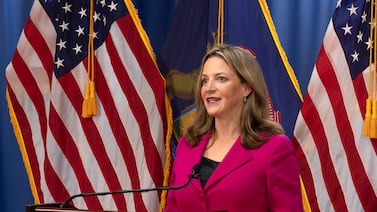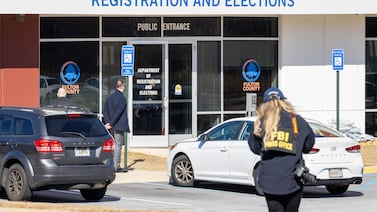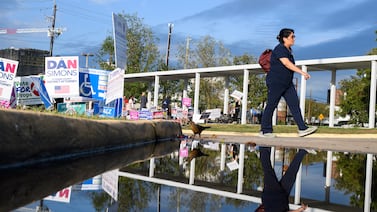Votebeat is a nonprofit news organization reporting on voting access and election administration across the U.S. Sign up for Votebeat Texas’ free newsletter here.
Election officials across Texas are investigating the eligibility of 2,724 registered voters flagged as “potential noncitizens” after the Secretary of State’s Office checked the state’s voter rolls against a federal database used to verify citizenship.
The inquiries are still in the early stages, and county officials have not yet confirmed the citizenship status of the vast majority of the flagged voters.
But at least six people listed as potential noncitizens have confirmed that they are, in fact, U.S. citizens, election officials told Votebeat: four in Denton County, and one each in Bexar and Brazoria counties.
Votebeat has so far contacted 24 counties, including the state’s most populous, seeking details about the flagged voter registrations, and has gotten responses from nine counties.
Chris McGinn, executive director of the Texas Association of County Election Officials, told Votebeat that election officials across the state want more information on the federal database’s sources and how it works.
“A lot of counties don’t feel comfortable just blindly canceling voters without really knowing how names have shown up on the SAVE database,” McGinn said, referring to Systematic Alien Verification for Entitlements, the search tool that states use to check residents’ eligibility for public benefits.
The Department of Homeland Security recently overhauled SAVE to make it easier for states to use it to screen their voter rolls for potential noncitizens. DHS did not immediately respond to a request for comment Thursday.
Alicia Pierce, the Texas Secretary of State’s Office spokesperson, said in a statement that counties have been able to prove citizenship “for a handful of these voters, which means the process is working exactly as it should.” She said that flagged voters have 30 days to respond to a notice from their county, and this process “will not affect anyone’s ability to vote in Tuesday’s election.”
Registrations submitted through Texas DPS are flagged
Election officials said that at least 193 of the flagged voters — across seven counties that together had a total of 565 — submitted their registration applications through the Texas Department of Public Safety. The agency requires proof of citizenship from anyone who wants to register to vote there, so some election officials said they are wondering how any noncitizens could have successfully registered through DPS.
Pierce referred questions to DPS, which did not immediately respond to a request for comment Thursday. During a legislative hearing in March, a DPS official told lawmakers that in order to register to vote at the agency, applicants must be a U.S. citizen and be at least 17 years, 10 months old.
“These requirements are actually programmed into our system, and they can’t be bypassed by an employee,” the DPS official said. “So if you don’t meet those requirements, you don’t get presented with the voter registration question.”
In a declaration filed Wednesday as part of a federal lawsuit challenging the overhaul of SAVE, Chris Davis, the voter registration director for Travis County, said that a quarter of the 97 people flagged there had registered at DPS.
County officials are required by law to mail notices to the flagged registrants seeking their citizenship documentation, and some have already sent the notices. If there’s no response after 30 days, the person’s registration is canceled. Pierce said counties have been advised to treat the voters flagged by SAVE as they would “any other data set.”
If county officials receive the documentation, they must send a copy to the state to be shared with U.S. Citizenship and Immigration Services, the Secretary of State’s Office told counties, according to a document filed in federal court as part of the lawsuit.
The election officials in Denton, Bexar, and Brazoria counties said the six voters whose citizenship they confirmed had responded to notices by showing a U.S. passport or naturalization documents.
Davis said Travis County is investigating each person flagged and has yet to mail out notices. In his court declaration, he said he’s concerned that the list his county received “is flawed” and that voters could be improperly dropped from the voter rolls.
Frank Phillips, the Denton County elections administrator, told Votebeat that one of the four flagged voters he checked on had become a U.S. citizen a month ago, but three others were naturalized between 2020 and 2023.
He added that he fears the mailed notices won’t be delivered or that voters won’t respond to them. “If they are citizens, their registration is going to get canceled, but it shouldn’t be,” he said.
Some added to the voter rolls in error by county officials
Texas has a paper-based voter registration system, which requires that election officials manually enter the information from each application they receive by mail or in person. Data entry errors are common.
In at least seven counties — including Bexar, Dallas, Collin, and Denton — election officials said people who submitted an application had accurately noted on the form that they were not U.S. citizens, but were nonetheless added to the voter roll in error by county officials. Those registrations have been canceled, and none of the 94 people involved had cast ballots, county officials said.
Aside from the people who attested that they weren’t citizens, officials in Bexar and Denton counties have confirmed that so far, they found one person in each county who was not a U.S. citizen and canceled their registrations. Those two people had never voted, the officials said.
Changes make SAVE free and easier for states to use
States have used SAVE for years to help determine whether people are eligible for benefits. However, access to the data for states was costly and required using a person’s immigrant ID number, which election officials don’t often have access to.
Earlier this year, the Trump administration revamped SAVE so that states could use it more easily to check their voter rolls for noncitizens using Social Security numbers, and could submit requests in batches instead of one at a time. States don’t have to pay to use it anymore.
But some experts have questioned the accuracy and reliability of the data, pointing to how quickly the changes to SAVE were made. They’ve also raised concerns about how the federal government is using the data uploaded by states, and whether using the tool puts people’s privacy or voting rights at risk. In addition, multiple audits and analyses have shown that the Social Security Administration’s citizenship information, one of the sources that SAVE calls on, is often outdated or incomplete, especially for people who became naturalized citizens.
Texas obtained access to SAVE in March, and said in May that, through SAVE, it had identified 33 potential noncitizens who had voted in the November 2024 election and referred them to the Texas Attorney General’s Office for investigation.
Last week, on the first day of early voting for the constitutional amendment election, Secretary of State Jane Nelson announced her office had run the state’s entire voter roll through it, or more than 18 million registered voters.
In the announcement, Nelson directed counties to conduct “rigorous investigations to determine if any voter is ineligible.” She said SAVE “has proven to be a critically important data set and one of many that we will continue to use in Texas to ensure that only qualified voters cast a ballot in our elections.”
Days later, Nelson touted a letter from President Donald Trump recognizing her as one of the first secretaries of state to “step up and protect the integrity of our elections by using the federal SAVE database.”
On Monday, Texas filed a motion seeking to intervene in the lawsuit challenging the use of SAVE, saying it needs continued access to comply with state and federal requirements for maintaining its voter list.
Natalia Contreras is a reporter for Votebeat in partnership with the Texas Tribune. Contact Natalia at ncontreras@votebeat.org.




